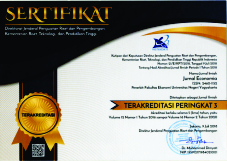Smart Economy: The Analysis of Youngpreneurs Development towards the SMEs in East Java Province
Downloads
Abstract
East Java Province is one area in Indonesia with many potentials in the creative industry sector, especially SMEs. Unfortunately, SMEs growth in East Java Province is relatively slow because most of them still do not use technological tools. The reason is, SMEs is not attractive enough to the millennial generation and are still not digitized. This research was conducted to determine SMEs' potential digitalization to attract the millennial generation's interest in SMEs. The result showed three main obstacles to applying technology tools in the SMEs industry: marketing networking, branding and packaging, and product standardization. Apart from the obstacle, there are also three essential things to increase their interest in SMEs sectors, which are: SMEs community; local materials distribution; and optimization of the entrepreneurial mindset. A smart economy strategy can become a long-term economic investment to overcome every obstacle and stimulate the growth and Youngpreneur interest in the SMEs industry.
Keywords:Millenial Generation, Smart Economy, SMEs
Downloads
Aljuwaiber, A. (2016). Communities of practice as an initiative for knowledge sharing in business organisations: a literature review. Journal of Knowledge Management, 20(4), 731–748. https://doi.org/10.1108/JKM-12-2015-0494
Amri, A. (2020). Dampak Covid-19 Terhadap UMKM di Indonesia. Jurnal Brand, 2(1), 147–153. Retrieved from https://www.academia.edu/42672824/Dampak_Covid-19_Terhadap_UMKM_di_Indonesia
Anttiroiko, A. V., Valkama, P., & Bailey, S. J. (2014). Smart cities in the new service economy: Building platforms for smart services. AI and Society, 29(3), 323–334. https://doi.org/10.1007/s00146-013-0464-0
Bakici, T., Almirall, E., & Wareham, J. (2013). A Smart City Initiative: The Case of Barcelona. Journal of the Knowledge Economy, Vol. 4, pp. 135–148. https://doi.org/10.1007/s13132-012-0084-9
Bank Indonesia, & LIPI. (2015). Profil Bisnis Usaha Mikro, Kecil Dan Menengah (UMKM). In Bank Indonesia dan LPPI. Jakarta.
Bank Indonesia. (2020). Roadmap Pengembangan Wisata Alam Taman Nasional Bromo Tengger Semeru. Malang.
Bjerke, B. (2007). Understanding Entrepreneurship. Cheltenham: Edward Elgar Publishing Limited.
BPPKI Surabaya. (2020). Kelas Online BPSDMP KOMINFO SURABAYA dan GOOGLE GAPURA DIGITAL. Retrieved November 9, 2020, from BPPKI Surabaya website: https://balitbangsdm.kominfo.go.id/upt/surabaya/berita-kelas-online-bpsdmp-kominfo-surabaya-dan-google-gapura-digital-5-16
Christian, M. (2017). Pengaruh Faktor Perilaku Pada Kelompok Millineal Terhadap Keinginan Untuk Berwirausaha. Journal of Business & Applied Management, 10(02), 92–105. https://doi.org/10.30813/jbam.v10i02.930
Deliarnov. (2012). Sejarah Pemikiran Ekonomi (7th ed.). Depok: PT RajaGrafindo Persada.
Deloitte. (2015). UKM Pemicu Kemajuan Indonesia. In Deloitte Access Economic. Surabaya.
Emil. (2018). Kabupaten Pasuruan Raih Penghargaan Gerakan Menuju 100 Smart City. Retrieved from Situs Resmi Pemerintah Kabupaten Banyuwangi website: https://www.pasuruankab.go.id/berita-4677-kabupaten-pasuruan-raih-penghargaan-gerakan-menuju-100-smart-city.html
Gupta, S., Malhotra, N. K., Czinkota, M., & Foroudi, P. (2016). Marketing innovation: A consequence of competitiveness. Journal of Business Research, 69 (12), 5671–5681. https://doi.org/10.1016/j.jbusres.2016.02.042
Harsono, F. H. (2019). Jokowi: Bonus Demografi adalah Tantangan dan Kesempatan besar. Retrieved from Liputan6 website: https://www.liputan6.com/health/read/4090717/jokowi-bonus-demografi-adalah-tantangan-dan-kesempatan-besar
Hendro. (2011). Dasar-Dasar Kewirausahaan. Jakarta: Erlangga.
Hoetoro, A., & Satria, D. (2020). Smart Economy: Kewirausahaan 4.0. Malang: UB Press.
Jackson, R., Drummond, D. K., & Camara, S. (2007). What Is Qualitative Research? In Qualitative Research Reports in Communication. https://doi.org/10.1080/17459430701617879
kompas.com. (2017). 1 dari 25 Daerah Percontohan "Smart City" adalah Banyuwangi. Kompas.Com. Retrieved from https://biz.kompas.com/read/2017/05/24/082900128/1.dari.25.daerah.percontohan.smart.city.adalah.banyuwangi
Malang City Government & Malang City Barenlitbang,. (2017). Roadmap Smart City: Kota Malang. Malang.
Martin, C., & Leurent, H. (2017). Technology and innovation for the future of production: Accelerating value creation. In World Economic Forum.
Ministry of Communication and Information. (2019). Perkembangan Ekonomi Digital di Indonesia: Strategi dan Sektor Potensial. Jakarta.
Ministry of Industry of the Republic of Indonesia. (2018a). Indonesia Butuh 4 Juta Wirausaha Baru untuk Menjadi Negara Maju. Retrieved from Kementerian Perindustrian website: https://kemenperin.go.id/artikel/19926/Indonesia-Butuh-4-Juta-Wirausaha-Baru-untuk-Menjadi-Negara-Maju
Ministry of Industry of the Republic of Indonesia. (2018b). Target Kontribusi Rp 1.000 Triliun, Kemenperin Suburkan Industri Kreatif. Retrieved from Kementerian Perindustrian website: https://kemenperin.go.id/artikel/19735/Target-Kontribusi-Rp-1.000-Triliun,-Kemenperin-Suburkan-Industri-Kreatif
National Council for Special Economic Zones. (2019). Kawasan Ekonomi Khusus Singhasari. Retrieved November 9, 2020, from https://kek.go.id
Rathee, R., & Rajain, P. (2017). Entrepreneurship in The Digital Era. Asia Pacific Journal of Research in Business Management, 8(6), 52–63. Retrieved from https://doi.org/10.1016/j.tmaid.2020.101607%0Ahttps:/
Rayyan, M. A., Octaviawan, A., & Billiyanto, R. (2019). From" Smart City" to" Smart Tourism": Developing The Role of Tourism in Asia. ASEAN/Asian Academic Society International Conference Proceeding Series, 67–74. Surabaya: Fakultas Ilmu Sosial dan Ilmu Politik Universitas Airlangga.
Seina, I. (2017). Jatimnomics Jadikan Ekonomi Jatim Inklusif dan Berkeadilan. Merdeka.Com. Retrieved from https://www.merdeka.com/peristiwa/jatimnomics-jadikan-ekonomi-jatim-inklusif-dan-berkeadilan.html
Sujarweni, V. W. (2015). Metodologi Penelitian : Bisnis dan Ekonomi. Yogyakarta: Pustakabarupress.
Suminar Ayu, A., Dwihantoro, P., & Lokantara, I. G. W. (2020). Understanding Creative Economy Concept through Innovation Adopters Perspective. Komunikator, 12(1), 11–23. https://doi.org/10.18196/jkm.121031
Sundari, C. (2019). Revolusi Industri 4.0 Merupakan Peluang Dan Tantangan Bisnis Bagi Generasi Milenial Di Indonesia. Prosiding SEMINAR NASIONAL DAN CALL FOR PAPERS, (Fintech dan E-Commerce untuk Mendorong Pertumbuhan UMKM dan Industri Kreatif), 555–563.
Suryana. (2013). Ekonomi Kreatif, Ekonomi Baru: Mengubah Ide dan Menciptakan Peluang. Jakarta: Salemba Empat.
Suyatna, H., & Nurhasanah, Y. (2018). Sociopreneurship Sebagai Tren Karir Anak Muda. Jurnal Studi Pemuda, 6(1), 527. https://doi.org/10.22146/studipemudaugm.38011
ukmindonesia.com. (2020). Izin Usaha Mikro Kecil (IUMK). Retrieved November 9, 2020, from ukmindonesia.com website: https://www.ukmindonesia.id/baca-izin/1486
Yudono, A., Satria, D., & Erlando, A. (2019). Toward Inclusive Development Through Smart Economy in Malang Regency. IOP Conference Series: Earth and Environmental Science, 328(1), 1–9. https://doi.org/10.1088/1755-1315/328/1/012008















